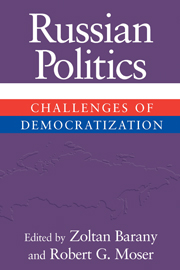Book contents
- Frontmatter
- Contents
- List of Tables and Figures
- List of Contributors
- Acknowledgments
- Introduction: Challenges of Russian Democratization
- 1 Russian Electoral Trends
- 2 Executive–Legislative Relations in Russia, 1991–1999
- 3 The Russian Central State in Crisis: Center and Periphery in the Post-Soviet Era
- 4 Russian Economic Reform, 1991–1999
- 5 Politics and the Russian Armed Forces
- Conclusion: Democracy and Russian Politics
- Index
2 - Executive–Legislative Relations in Russia, 1991–1999
Published online by Cambridge University Press: 05 June 2012
- Frontmatter
- Contents
- List of Tables and Figures
- List of Contributors
- Acknowledgments
- Introduction: Challenges of Russian Democratization
- 1 Russian Electoral Trends
- 2 Executive–Legislative Relations in Russia, 1991–1999
- 3 The Russian Central State in Crisis: Center and Periphery in the Post-Soviet Era
- 4 Russian Economic Reform, 1991–1999
- 5 Politics and the Russian Armed Forces
- Conclusion: Democracy and Russian Politics
- Index
Summary
During the initial years of Russian statehood, the tumultuous relationship between the executive and legislature in Russia seemed to be the major impediment to democratic consolidation. In the First Russian Republic the power struggle that developed between President Boris Yeltsin and the Congress of People's Deputies led to a constitutional crisis that was ultimately decided by the use of force in the streets of Moscow. In the wake of this constitutional crisis, President Yeltsin, unfettered by the need for approval from the disbanded legislature or a constitutional assembly, constructed a political system that concentrated most formal powers in the executive branch. However, contrary to the initial expectations of the Yeltsin team, new parliamentary elections did not produce a more reform-minded legislature.
Instead, throughout the Yeltsin years the Russian state continued to be divided between a “reformist” president and an “antireformist” legislature. Opposition parties solidified control over the State Duma in 1995, and the Communist Party of the Russian Federation (CPRF) emerged as the largest political party in the country and the center of an opposition that controlled a working legislative majority. Six months later President Yeltsin managed to win reelection despite initially anemic approval ratings. Thus, conflict remained a constant feature of Russian executive-legislative relations, waxing and waning depending on the domestic political environment and leaders' strategic decisions.
- Type
- Chapter
- Information
- Russian PoliticsChallenges of Democratization, pp. 64 - 102Publisher: Cambridge University PressPrint publication year: 2001
- 2
- Cited by



